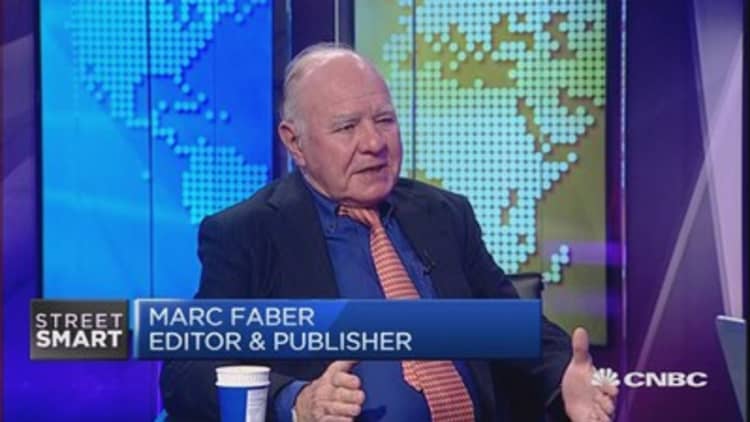
Global markets may have convulsed since China pushed its currency lower this week, but the step is "completely meaningless," given its relatively small move, perma-bear Marc Faber, publisher of The Gloom, Boom & Doom Report, said.
"You have to look at the Chinese currency in the context of all other currencies," Faber told CNBC. "Over the last few years, the yuan has appreciated the dollar and the dollar has appreciated against just about anything in the world ," he said, noting the Chinese currency's move is relatively small and appears justified.
After allowing the to weaken a total of around 3 percent against the U.S. dollar on Tuesday, Wednesday and Thursday amid a shift toward a "managed float" regime, the People's Bank of China (PBOC) set Friday's fixing at a slightly stronger level. That may signal that the string of aggressively weaker fixings is finished for now.
"The 2 or 3 percent devaluation of the yuan [against the U.S. dollar] is completely meaningless," Faber said. "The Chinese yuan has appreciated by 80 percent over the past two years against the yen."
Read More Welcome to China's new 'managed float' regime
Additionally, in contrast to the yuan's relative strength, has shed around 60 percent against the U.S. dollar since 2011, while Turkey's lira has lost 50 percent and all other Asian currencies, with the exception of the Hong Kong dollar, have all been weak over the past year, he noted.
"Don't forget the People's Bank of China has said that they will have now a currency that will reflect more market forces. And that means that if the market forces are against the currency, then the currency will go down," Faber added.
Faber sees one major casualty if the yuan continues to weaken: the Hong Kong dollar, which is pegged to the U.S. dollar.
"If the yuan weakens by 10 percent, what happens to the Hong Kong dollar? That's the big question," Faber said. "The Hong Kong dollar may depeg, because then Hong Kong becomes massively uncompetitive," he said, noting that all other Asian currencies have weakened.
"The Hong Kong dollar is a good short," Faber added, although he noted he doesn't currently have a short position. "It's quite likely [to depeg]. If you are bearish about the yuan - and I'm quite negative about the yuan."
To be sure, predictions that Hong Kong's dollar peg would snap have dogged the currency since the system was set up in 1983. The Hong Kong Monetary Authority (HKMA) intervenes periodically when the currency strays from its level of 7.75-7.85 against the U.S. dollar.
Read More China's yuan depreciation could hit domestic firms
One factor that may drive bigger declines in the yuan is that the currency is also reflecting weakness in the Chinese economy, Faber noted.
"It's quite obvious even to the greatest optimist about China that the economy is not doing well at the present time," he said. "In July, car sales were down around 7 percent and luxury goods manufacturers all complain. Commodity markets, industrial commodities have collapsed over the last two to three years."
China released a raft of disappointing economic data for July on Wednesday, with industrial output growing an annualized 6.0 percent for the month, well below expectations for 6.6 percent from a Reuters poll and down from 6.8 percent in June.
"The Chinese economy is much weaker than the consensus believes. I maintained a year ago that if China grows by 4 percent they'd be lucky," Faber said. "Right now, the economy is probably not growing at all, maybe 2 percent."
That contrasts with official data showing the Chinese economy grew at 7.0 percent on year in the second quarter, a figure that was in line with the previous quarter and slightly better than analysts' forecasts.
But Faber noted that figure was from the government, adding: "Have you ever seen a government that doesn't lie? I haven't."
--Nyshka Chandran, Ansuya Harjani and Dhara Ranasinghe contributed to this article.
—By CNBC.Com's Leslie Shaffer; Follow her on Twitter @LeslieShaffer1


